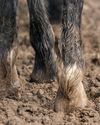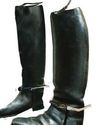
RIDERS who are too heavy for their mounts can cause temporary lameness, which could become a permanent issue in the long term.
The latest results of a study led by the Animal Health Trust (AHT) last September show that a high ratio of horse-to-rider weight has a “substantial” negative effect.The study involved six horses, each ridden by four riders of different weights. And although all six finished it moving at least as well as at the start, all the tests involving the two heaviest riders had to be abandoned, mainly owing to the temporary lameness.
The results were to be announced by Dr Sue Dyson, AHT head of clinical orthopaedics, who led the study, at the National Equine Forum today (8 March).
“I had expected this, based on previous clinical observations,” said Dr Dyson. “I have seen many horses ridden sequentially by people of very different weights and seen an immediate change in the way the horses moved. I have evidence of horses in full work with no underlying clinical problem showing lameness when ridden by a heavy rider. Horses with low-grade lameness when ridden by a light rider may show much more obvious lameness when ridden by a heavier rider.
Denne historien er fra March 08, 2018-utgaven av Horse & Hound.
Start din 7-dagers gratis prøveperiode på Magzter GOLD for å få tilgang til tusenvis av utvalgte premiumhistorier og 9000+ magasiner og aviser.
Allerede abonnent ? Logg på
Denne historien er fra March 08, 2018-utgaven av Horse & Hound.
Start din 7-dagers gratis prøveperiode på Magzter GOLD for å få tilgang til tusenvis av utvalgte premiumhistorier og 9000+ magasiner og aviser.
Allerede abonnent? Logg på

Gemirande provides 24-carat magic
Venetia Williams sparkles again in the December Gold Cup and jockey brothers dead-heat

‘Happy hunting, everyone'
“The season for talks, dinners and parties has finally arrived for Tessa Waugh, whose distress about the snags of middle age fades away with some rousing festive spirits

'Monaco deserved this victory
Seemingly destined always to play the bridesmaid’s role, Harrie Smolders’ great partner Monaco finally tops an incidentpacked Rolex grand prix

'It had to end sometime'
The closure of beloved Hampshire saddlery Calcutt Sons is a loss to the hunting and wider equestrian worlds, as Octavia Pollock reports

'You couldn't want for more
The Ludlow's peaceful country makes for a day in \"hunting paradise\"

The greatest gift of all
Christmas is fast approaching and while we all like a bit of tinsel, the festive season is also a perfect time for giving to a horse charity. Niki Hinman finds out some of the options

Winter him well
A horse's winter routine can differ dramatically from his summer structure but what’s the knock-on effect? Ellie Hughes asks vets how to optimise routine management for the season

Neat feet
Excellent hoof care is a year-round concern but the winter months present their own problems. Richard Stephenson MRCVS explains the seasonal challenges afoot and how to stay one step ahead

In bygone days
Modern vets have much scientific knowledge behind them, but what about their forebears? Kieran O’Brien MRCVS opens up the world of Victorian vets in London

'When I joined the Pony Club it was just two boys and 48 girls'
Pepsi Kohler on being delightfully outnumbered by girls in the Pony Club, a leg-up from a royal and the H&H advert that changed his life